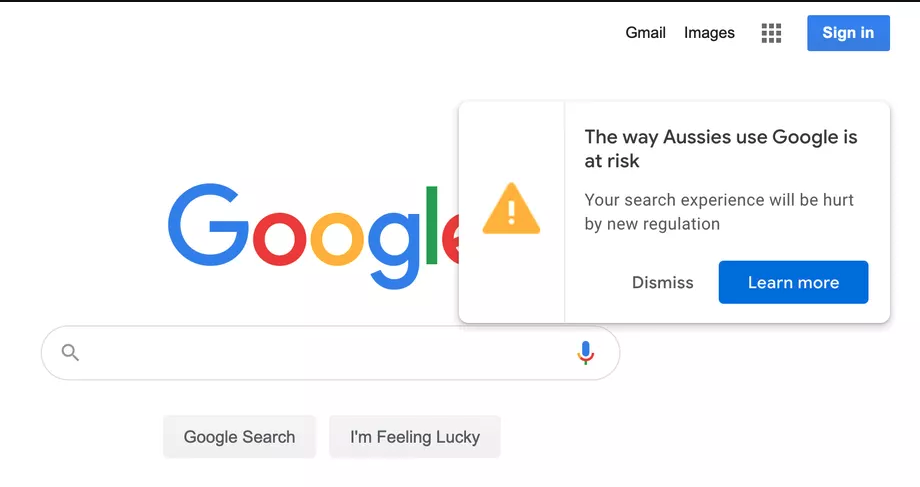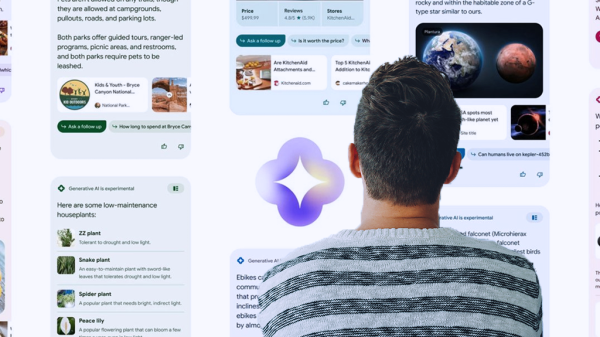Google made a power move by communicating directly to Australian consumers with a pop-up on the Google search home page. The open letter to Aussies is the latest in response to Australia’s push to pass a law that would require Google and Facebook to pay media publications for their news content.
News media companies have suffered in many markets with the fall of print media and rise of online news, affecting the companies’ ability to collect ad revenue. The Australian government says that Australian news outlets have been impacted even more acutely by the coronavirus pandemic, with over one hundred local papers in the country laying off reporters and either stopping printing or closing entirely.
Google’s open letter to Aussies, penned by the Australia Managing Director, Mel Silva, warns that the rule would unfairly advantage big media industries by requiring Google to share data to help them artificially boost their rankings. This would jeopardize the quality of search results and possibly even user data, claiming “There’s no way of knowing if any data handed over would be protected, or how it might be used by news media businesses.”
The Australian Competition and Consumer Commission (ACCC), the watchdog that authored the proposed law, says the open letter contains inaccuracies. They claim that Google would not be required to share any additional use data with the media unless it chooses too, and would also not require Google to start charging for its free services like Search and Youtube.
Of course, it is any company’s prerogative to communicate directly with its customers, even its non-paying customers. But if this communication is effective in wielding the power of Google’s millions of Australian civilians to counter the government’s regulations, it behooves Aussies to leverage Google to understand the facts and verify Google’s claims against the text of the regulation.
The decision to highlight bellicose language like “at risk” and “hurting” to describe the effects of the law, without explaining the proposed law itself, is a clear attempt to manipulate an emotional reaction from users by painting the law as a threat to free services, rather than an attempt to protect a healthy democracy.
The spread of misinformation online is threatening democracies around the world, and Google should take a hard look at its role in that.
Google published a more detailed blog post on the matter on May 31, entitled “A fact-based discussion about news online.” The post essentially claims that Google Australia doesn’t gain that much revenue from news searches (only 10 percent!) so how could it possibly be ‘taking’ that money from the media? Furthermore, 2018 Google searches accounted for 3.44 billion visits to Australian news publishers – at no charge to the publishers! That’s a lot of clicks! Can’t you feed your kids with them clicks, Aussie news monsters?
This is not the first time Google has made political noise. In 2018, Google displayed Youtube notices about an EU copyright proposal and in 2014, closed Google News in Spain entirely over a similar dispute as Australia.
In the end, the question remains – in Australia, the US, and elsewhere – whether tech giants like Google and Facebook should hold outsized market control of paid advertising online.
But the lengths Google is currently taking to undermine this governmental action is a testament to just how far this company has come in 22 years. In 1998, Google’s founders Sergey Brin and Lawrence Page published an academic paper from the Stanford computer science department entitled “The anatomy of a large-scale hypertextual Web search engine.” Yes, that search engine was named Google.
The paper describes a novel approach to enhance the effectiveness of a large-scale search engine in the early days of the internet. In addition to an apropos search result example for the term “Bill Clinton,” the paper comments on paid advertising.
In Appendix A: Advertising and Mixed Motives, the authors assert that a conflict of interest could arise when a high-quality search result is counter to the goals of a paid advertiser. They conclude that “advertising funded search engines will be inherently biased towards the advertisers and away from the needs of the consumers.” In 2019, paid advertising accounted for 70.9 percent of Google’s revenue.
Sure, the internet of 2020 is not the beloved wormhole of yesteryear, when the online world was mostly made of blogs, games, and community forums. Google has grown with the times (or even ahead of them), as any smart tech company should. So perhaps holding 2020 Google to a 1998 standard is unfair.
Nonetheless, I leave you with the authors’ conclusion to the advertising discussion from their original concept: “…we believe the issue of advertising causes enough mixed incentives that it is crucial to have a competitive search engine that is transparent and in the academic realm.”
Transparency isn’t outdated, is it Google?
Heather Buffo is a Cleveland native, a recovering Bostonian, and an Austin newbie. Heather is the Venture Growth & Partnerships Lead at Republic where she works with partners in private investing to democratize access to capital for entrepreneurs. Heather studied neurobiology at Harvard University, and is a City Year Boston AmeriCorps alum. She likes to write for AG, drink Austin beer, and ride around town on her road bicycle. His name is Pippin. Say hello if you see them.













































Pingback: Australia vs Facebook: A conflict of news distribution